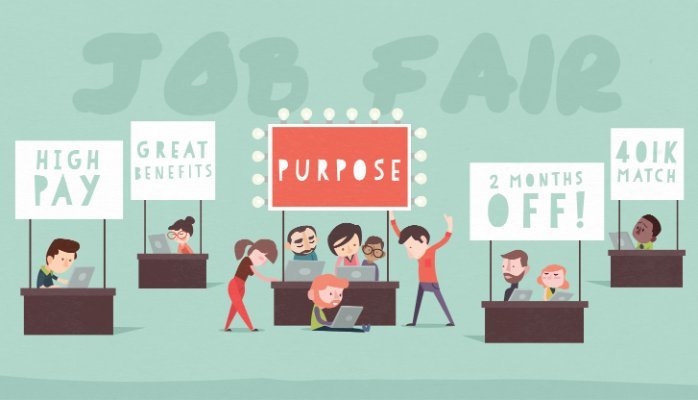Reed Hoffman. Power goals at work

In 2002, LinkedIn had very few bonuses that Silicon Valley is famous for. The headquarters of the company was my apartment. Maybe free lunches? Only if there was an extra yogurt in the fridge or a can of cola, if you could find it dinner. Ergonomic sleep booths, yoga class, wellness centers, concierge services or maybe a free haircut? Not.
And yet, every day my co-founders came very early and stayed late. We looked for opportunities to improve service, reputation, trust and analyzed data. Our goal was to create a platform that will create earning opportunities for every person in the world. This is an ambitious project and it gave us the strength to implement it.
')
In a startup get-together, when teams are still small and almost every participant risks everything with the desire to create something potentially outstanding, it is relatively easy to find goal-oriented people.
But in order to become a dream company, we knew that in the end we needed more diverse people, with diverse skills and temperaments, which would inevitably lead to a change in the current corporate culture. In my buddy courses, in our class at Stanford, we tell you that a company with a staff of a hundred people cannot function effectively using the tactics that companies with ten employees work with. For successful work, you must change tactics.
Nevertheless, we were determined to maintain our common sense of purpose, as a fundamental value, even when the company's staff grew. In job interviews, we have always emphasized this. Any change to the platform should improve it in such a way that the economic opportunities of users only increase.
Strongly emphasizing our philosophy, we inevitably refused some potentially talented employees who were not ready to agree with her. Thus, we attracted like-minded people, which ensured the invariance of our policy even when we began to expand our staff.
Today, LinkedIn has more than 9,200 employees. Needless to say, we have gone beyond my apartment, and now the company is dispersed in offices in more than 30 cities around the world. And the choice of free drinks soon became wider.
But while tartar with salmon and avocado in our cafe and a bunch of other bonuses make working on LinkedIn quite enjoyable, the defining feature of our employees is a sense of purpose.
In fact, this is true. Imperative conducted a study that showed that 41% of employees have similar goals to the company, although on average in the US IT industry this figure does not exceed 21%. LinkedIn has achieved this in several ways.
According to the Imperative study:
- 54% of motivated employees have been working in the company for more than five years;
- 30% more productive;
- 69% higher number of “promoter employees” (enthusiasts who are happy to advertise their company) on the Net Employee Support Index (eNPS), which measures employee engagement and loyalty.
In The Alliance: Managing Talent in the Networked Age, my co-authors and I present the “internship” as a mechanism for building and maintaining working relationships in an era when life-long employment is no longer mainstream. The key to a successful internship is a high degree of compliance between the employer and the employee, and the key to a high degree of compliance is a general sense of purpose.
If a general sense of purpose takes place, employees work longer in the company. Their high level of engagement leads to higher loyalty and productivity.
At the time of life-long employment, everything was predetermined, now more and more professionals are looking at positions in companies where personal growth is possible and they could have a significant impact.
Companies that understand the growing importance of goals in the modern professional landscape improve their abilities to attract such employees, as well as their ability to interest them for a long time.
When I see LinkedIn thousands of employees striving to create economic opportunities for every employee in the world, I become even more confident in our goals. Jeff Weiner (CEO LinkedIn) calls this LinkedIn vision “a sense of true north,” while he is guided by his more than a decade of experience, and helps us attract and retain the people we need.
Source: https://habr.com/ru/post/296122/
All Articles